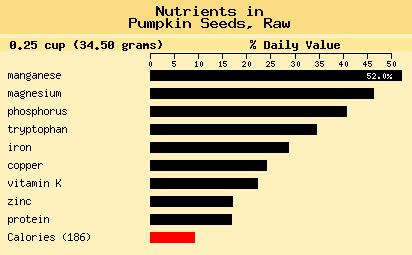Nutrients in Pumpkin Seeds. 
Pumpkin seeds are a very good source of the minerals phosphorus, magnesium and manganese. They are also a good source of other minerals including zinc, iron and copper. In addition, pumpkin seeds are a good source of protein and vitamin K.
Pumpkin seeds, also known as pepitas, are flat, dark green seeds. Some are encased in a yellow-white husk, although some varieties of pumpkins produce seeds without shells. Pumpkin seeds have a malleable, chewy texture and a subtly sweet, nutty flavor. While roasted pumpkins seeds are probably best known for their role as a perennial Halloween treat, these seeds are so delicious, and nutritious, that they can be enjoyed throughout the whole year.
Like cantaloupe, cucumber, and squash, pumpkins and pumpkin seeds belong to the gourd or Cucurbitaceae family. The most common genus and species name for pumpkin is Cucurbita maxima.
Rich Source of Healthful Minerals, Protein and Monounsaturated Fat
In addition to their above-listed unique health benefits, pumpkin seeds also provide a wide range of traditional nutrients. Our food ranking system qualified them as a very good source of the minerals magnesium, manganese and phosphorus, and a good source of iron, copper, protein, and as previously mentioned, zinc. Snack on a quarter-cup of pumpkin seeds and you will receive 46.1% of the daily value for magnesium, 28.7% of the DV for iron, 52.0% of the DV for manganese, 24.0% of the DV for copper, 16.9% of the DV for protein, and 17.1% of the DV for zinc.
Nutrients in Kidney Beans
Nutrients in Peanuts
Nutrients in Sunflower Seeds